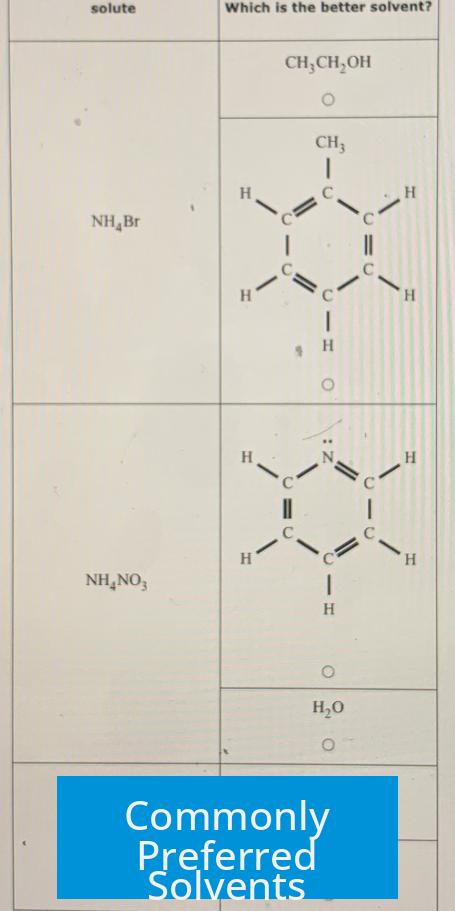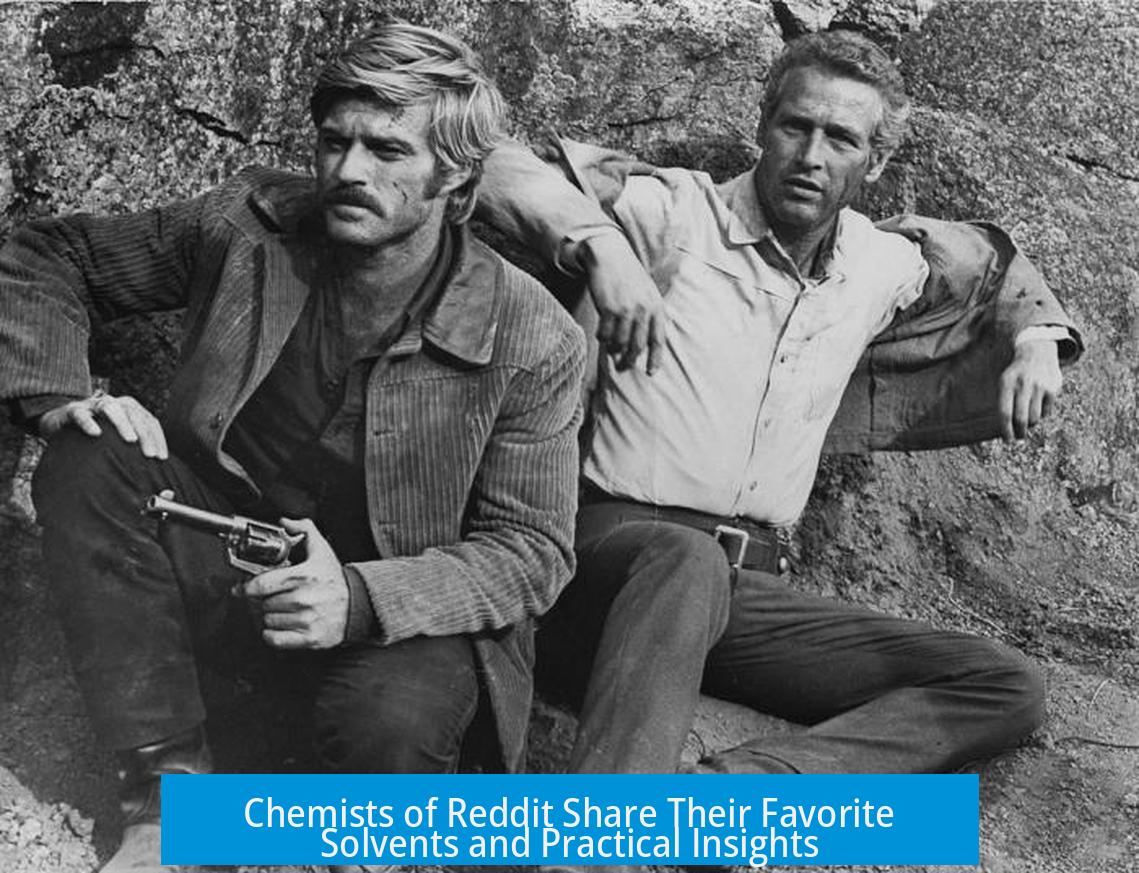Chemists of Reddit express diverse preferences about their favorite solvents, reflecting the broad spectrum of chemistry disciplines and practical laboratory needs. Commonly cited solvents include acetone, ethyl acetate, diethyl ether, water, toluene, dichloromethane (DCM), and tetrahydrofuran (THF). Preferences are shaped by factors such as usability, safety, smell, versatility, and historical familiarity. Specialty solvents and safety considerations also play critical roles in these choices.
Commonly Preferred Solvents

Acetone
Acetone is frequently favored for its effectiveness as a cleaning agent and unique chemical properties. Reddit chemists value it for its ability to dissolve a wide range of substances and for its notable smell.
- Used for cleaning glassware and removing organic residues.
- Distinct smell is generally well-liked.
- Physically notable: reportedly can cause garments or gloves to freeze in extreme cold.
- Advantages: low toxicity and partial solubility in water enhance its practical use.
Ethyl Acetate

Ethyl acetate appears as a reliable solvent in synthetic and forensic chemistry contexts.
- Commonly used in extractions, workups, and transfers.
- Recognized for a pleasant, sweet aroma.
- Favored in forensic toxicology and clinical chemistry applications.
Diethyl Ether
Diethyl ether holds a near-celebrity status among organic chemists.
- Critical for Grignard reactions and other organometallic processes.
- Appreciated despite its volatility and flammability.
- Referred to as “keeping chemists on their toes” due to handling precautions.
Water
Water remains “the solvent of life” and a persistent favorite for safety reasons.
- Non-toxic, cheap, non-flammable.
- Universal solvent used widely across chemical disciplines.
- Often paired with ethanol to enhance solvent properties.
Toluene
Toluene gains mention both for practicality and sensory appeal.
- Strong, distinct smell favored by many Reddit chemists.
- Widely used for dissolving organic oils and resins.
- Less common in daily routine but appreciated for solvent power and nostalgia in organic synthesis.
Dichloromethane (DCM)
DCM stands out for its polar nature and instrumental role in environmental and inorganic chemistry.
- Used for flask cleaning and as a reaction solvent.
- High solvating ability for certain metal complexes.
- Prevalent in environmental analytical methods.
- Considered toxic and can degrade certain glove materials.
Tetrahydrofuran (THF)
THF gets special mention from organometallic chemists.
- Valued for excellent solvent capacity, especially for organometallic species.
- Noted for its distinctive smell and stain-removal capacity.
- Commonly paired with other solvents like benzene, toluene, and ether.
Ethanol and Other Alcohols
Finally, alcohols such as ethanol and methanol are popular for versatility, safety, and smell.
- Ethanol preferred, often with humorous associations to culture.
- Methanol valued for cleaning properties, though toxic.
- Isopropyl alcohol (IPA) also frequently mentioned for disinfection and cleaning.
Specialty and Less Commonly Used Solvents
Acetonitrile (ACN)
Acetonitrile sees wide use, particularly in chromatography and specialized synthetic work.
- Main solvent in liquid chromatography due to miscibility and solvating properties.
- Reported risk of cyanide poisoning if improperly handled.
- Preferred when higher boiling solvents are required.
Dimethyl Sulfoxide (DMSO)
DMSO is favored for aggressive solvency power but also noted for its potent odor and unique properties.
- Excellent polar aprotic solvent.
- May cause garlic-like smell in handling.
- Used when difficult dissolution is necessary.
N-Methyl-2-pyrrolidone (NMP)
Though often viewed negatively, NMP provides fast and efficient solvation.
- Used when speed in dissolution is essential.
- Known for unpleasant reputation yet high effectiveness.
Other Noteworthy Mentions
- Methyl tert-butyl ether (MTBE) – valued for smell and process compatibility.
- Aqua regia and strong acids – unbeatable for dissolving noble metals like gold.
- Chloroform and carbon tetrachloride – historically significant, with toxic concerns.
- Carbon disulfide – mentioned with playful challenge.
- 1,2-Difluorobenzene – specialized solvent for organometallic crystallizations.
- Dimethylformamide (DMF) – universally dissolves many compounds despite toxicity.
Safety, Toxicity, and Practical Considerations
Safety and toxicity frequently influence solvent preferences among chemists.
- Water and ethanol favored for low toxicity and accessibility.
- Acetone appreciated for its lower toxicity compared to many organic solvents.
- DCM and benzene, despite efficacy, are recognized as hazardous, requiring careful handling.
- Many chemists note that solvents prompt reactions with gloves or skin, emphasizing lab safety culture.
- Environmental health and safety concerns impact solvent choice, reflecting regulatory awareness.
Humorous and Personal Insights
The Reddit chemistry community shares humor and personality in solvent discussions.
- Some liken solvent smell preference to quirky hobbies.
- Comments highlight dangers of smelling solvents, often with playful admonitions.
- Others joke about nontraditional “solvents” like tequila in a chemistry context.
- Computational chemists joke about preferring no solvent at all, reflecting their in silico work.
Summary of Favorite Solvent Attributes
| Solvent | Common Uses | Key Attributes | Safety Notes |
|---|---|---|---|
| Acetone | Cleaning, dissolving | Low toxicity, good smell, water miscible | Flammable; mild toxicity |
| Ethyl Acetate | Extractions, workups | Sweet smell, organic solvent | Moderate toxicity |
| Diethyl Ether | Grignard reactions | Excellent solvation, volatile | Highly flammable, explosive risk |
| Water | Universal solvent | Safe, cheap, non-flammable | Safe |
| Toluene | Organic synthesis, cleaning resins | Strong smell, effective solvent | Neurotoxic in high doses |
| Dichloromethane (DCM) | Cleaning, synthesis | Good polarity, effective | Toxic, evaporates quickly |
| THF | Organometallic reactions | Good solvency, moderate boiling point | Flammable, can form peroxides |
| Ethanol | Cleaning, solvent | Safe, good smell | Flammable |
Conclusive Key Points
- Favorite solvents vary by chemical discipline, purpose, and personal preference.
- Acetone, ethyl acetate, diethyl ether, water, toluene, DCM, and THF are commonly favored.
- Specialty solvents address unique synthetic or analytical needs.
- Safety, toxicity, and environmental considerations significantly influence solvent choice.
- Cultural elements, such as smell and personal experiences, shape chemists’ attachments to certain solvents.
- Humor and shared anecdotes highlight the tight-knit chemistry community on Reddit.
What makes acetone a favorite solvent among chemists?
Acetone is a popular cleaner. It dissolves many substances quickly and has low toxicity. Many appreciate its smell and usability in cold conditions. It’s also water soluble, which adds flexibility in labs.
Why do some chemists prefer diethyl ether despite its risks?
Diethyl ether is prized for its effectiveness in organic reactions like Grignard. Its volatility keeps chemists alert. Despite flammability, its solvent properties make it a top choice for specific tasks.
How do safety concerns influence solvent choices among chemists?
Water and ethanol are often chosen for safety and low toxicity. Many chemists mention these as safest solvents. Others balance effectiveness with risk, using solvents like DCM but with precautions in place.
What special roles do solvents like DCM and THF play in chemistry?
DCM is popular for cleaning and reactions, especially in environmental and inorganic chemistry. THF is favored in organometallic chemistry and for removing oily stains. Both have unique properties suited for complex tasks.
Are there any solvents favored for their smell or sensory properties?
Toluene is noted for its strong smell, favored by some chemists despite limited everyday use. Ethyl acetate is also liked for its sweet scent. Some even mention sniffing solvents humorously, showing sensory appeal matters.





Leave a Comment